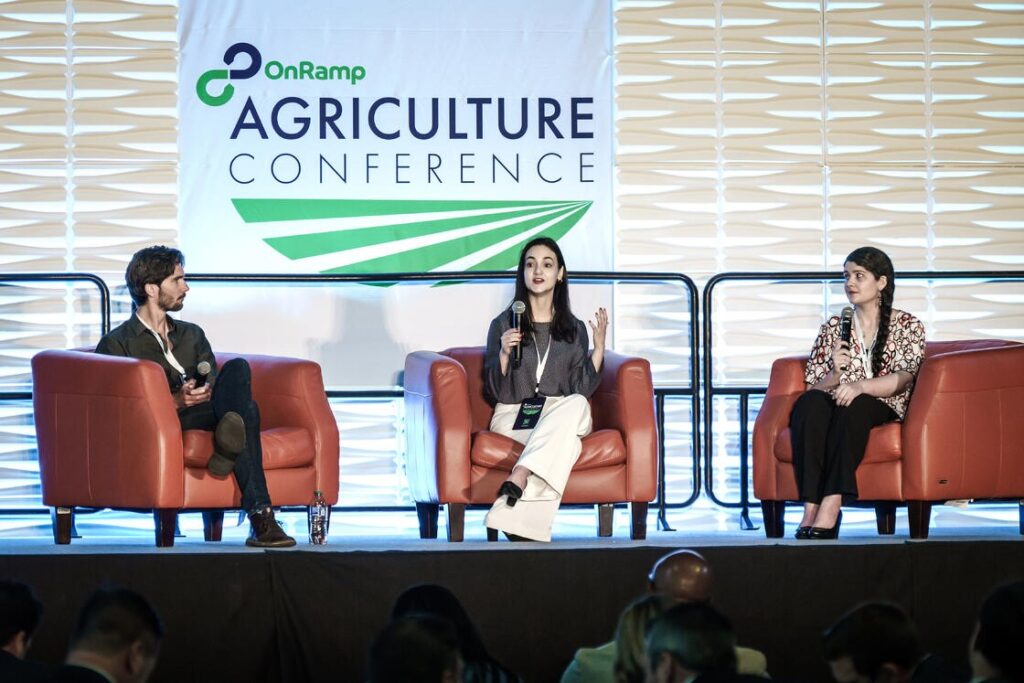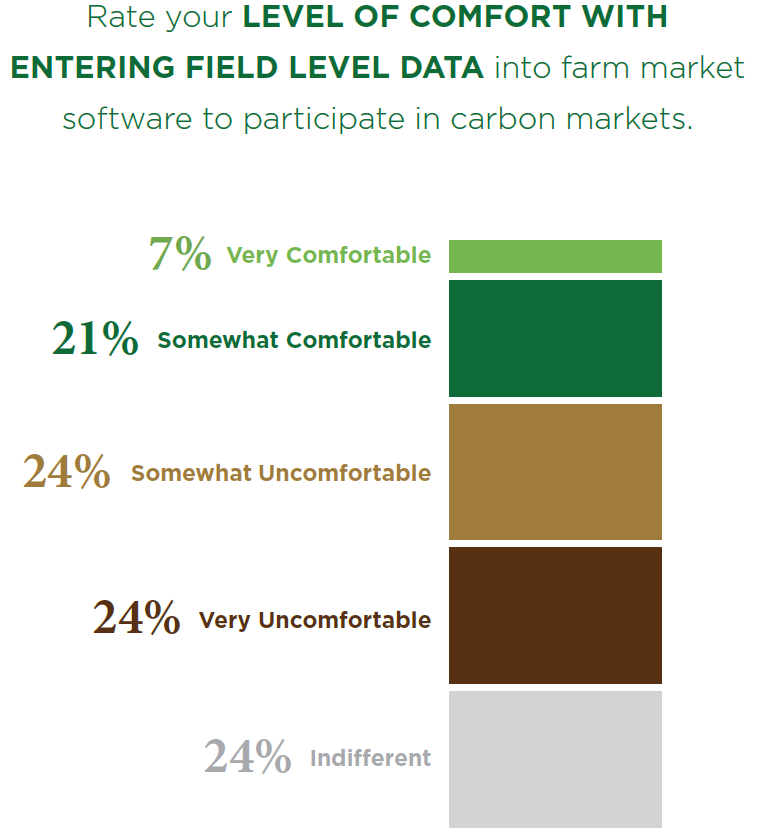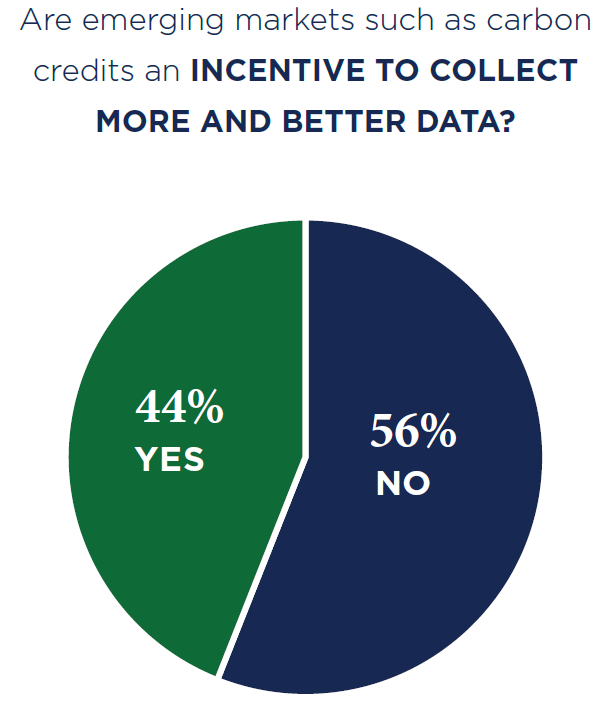I was thrilled to attend the OnRamp Agriculture Conference from July 25-26 as a panelist alongside Teresa Garcia-Moore, representing long-time Trust In Food partner The Sustainability Consortium, and Kenny Fahey, CEO of Leading Harvest. In front of an innovation-minded audience of agtech startup founders and their potential funders, we discussed the barriers between those organizations and their goal of scaling sustainable agriculture, as well as strategies to apply to meet that challenge.
Kenny spoke to a key need Leading Harvest has identified: creating consistent standards for sustainability outcomes without removing farmer choice. Teresa added that The Sustainability Consortium’s supply chain professionals hope to de-risk practice changes that might take up to three years to begin paying off for producers, solving for challenges identified in research by Soil Health Institute.
Yet data management, more than any other topic, emerged as the key theme of the discussion. After all: Most of the startups in attendance aim to provide farmers, food companies and financiers with new tools to collect and aggregate farm operations’ information.

For our team at Trust In Food and our collaborators at The Sustainability Consortium, this dovetails exactly with the trends we see in the marketplace. In our co-produced 2021 report Farmer Perspectives On Data, we provided a stark picture of the adoption issues digital ag faces. In 2020, nearly two-thirds of farmers did not use a farm information software system to gather intelligence about their operations. Close to half of those farmers reported keeping records primarily with pen and paper. Interestingly, despite broad aversion to data collection, 86% of farmers in the same group answered that they might be willing to share data in theory if provided with incentives that “make their operations more profitable.”
What explains this gap? Although time and cost emerged as significant roadblocks to digital systems, other factors with a human dimensions bent proved to be greater barriers: 73% of respondents did not trust private companies with their data, and 69% listed “privacy concerns” as a top impediment to sharing. This implies many farmers discount the known benefits of data-driven profitability against the potential downside risk of doing business with a partner they don’t trust.
Our 2022 State of Sustainable Ag report, conducted in collaboration with Field to Market, sheds further light on these findings. That survey found 59% of farmers had not calculated whether their regenerative practices had yielded economic benefits in the past five years. This is despite many farmers reporting that operation-wide profitability is their key indicator for annual performance. A majority (53%) did not feel food companies, food retailers or other private companies should influence on-farm practices, while a large majority (88%) had entirely avoided incentive programs that might demand either that influence or greater data access.
In addition to data, our panel discussed carbon markets as an example of an emerging opportunity for farmers that will make trust and record-keeping using data more important than ever. Forthcoming Trust In Food research I’ve authored on carbon markets (preview here) shows that within the past year, 93% of farmers have heard of voluntary carbon markets as an income source. Yet 90% have not yet seen any offerings that move them to say, “Yes, I’m ready to join.”
As Teresa explained, there is good reason to hope that carbon markets and new digital tools can help producers. Anything that provides additional revenue streams to bridge the adoption gap during the first three years of a newly implemented conservation practice could be a big win for both farmers and the landscape.

But what carbon or ecosystem service incentive providers should never forget is that farmers understand their relationship: they are not customers, but rather suppliers of credits generated by practices they implement. It isn’t good business to become a vendor without confidence that you align with your buyer’s goals, understand your product’s value, and see a path to justify the setup effort, cost, and aggravation.
Incentives alone won’t scale carbon marketplace enrollment, according to farmers who responded to the 2021 Farm Journal Technology Survey. That poll found that 56% report existing marketplace incentives aren’t enough to spur the necessary collection of more and better data. With their own setup costs to consider, OnRamp’s attendees can likely sympathize.

Before the panel ended, Dr. Cintia Ribeira, Carbon Field Program Lead at Bayer Crop Science, asked how agribusiness can better show it is keeping the needs of farmers in mind. Our perspective here at Trust In Food—informed by Farm Journal’s proprietary data and insights—is that farmers, like anyone else, make decisions along the human dimension, which goes beyond economic and environmental motivations. Awareness of the degree to which farmers understand, value, and feel capable of action in a specific area of sustainability or innovation is critical to breaking down barriers for the adoption of new technologies and new marketplaces.
In other words, before you ask for a farmer’s data, use human dimensions data already available to you—and learn enough to build long-term relationships with producers on trust. This principle is true both at the accelerator stage and across the food value chain.
If you’d like to receive the latest data-driven sustainability and innovation insights on farmers and ranchers, sign up for Trust In Food’s newsletter. In upcoming issues this summer, we’ll dig further into the human dimensions of change and publish an exclusive first look at our new carbon markets report.
I greatly enjoyed this exciting conference and the opportunity to visit beautiful Champaign, IL. Thanks again to the team at gener8tor for the opportunity to present our panel at OnRamp. There’s never been a better time to envision the path toward a more digitized economically viable U.S. agriculture for farmers and ranchers.



